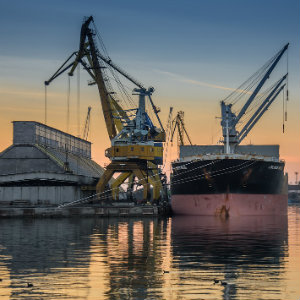Are you a seaman who has recently been injured while working at sea? You may be wondering about your rights.
- Can I sue my employer for causing my injury?
- Who will be held liable for my medical expenses?
- What happens if I can't return to work?
Our lawyers are here to answer your questions and build your case.

We're prepared to help you hold your negligent employer liable for your expenses.
Maritime work is a highly demanding profession. Most people probably take it for granted, but offshore workers help to provide us with many of the commodities we enjoy on a daily basis. In the process, they withstand brutal working conditions. Even when everything is going fine, being a seaman is a tough job. These workers don't deserve any added difficulties as the result of employer or coworker negligence.
The Jones Act is a federal law which protects these workers when they're injured at sea. While most American industries are bound by workers' compensation laws, this act allows injured or ill crew members to hold their employers accountable if workplace negligence contributed to their injuries.
When Does The Jones Act Apply?
The Jones Act applies to any injury or illness which could have been prevented but not for the negligence of other crew members, the captain, or the owner of the ship. This statute helps to protect maritime workers, and also encourages sea vessel employers to exercise more caution in order to protect their employees.
In most other industries, owners and management are protected from liability by workers' compensation. This means that they face no real consequences when their negligence leads to a worker's injury. The Jones Act helps injured workers earn the compensation they deserve while recovering from work injuries and illnesses.
FREE CONSULTATION
Common Maritime Accident Causes
Sea workers face a variety of hazards while onboard. Common causes of accidents which result in Jones Act claims include:
Slips, trips, and falls
Ship decks which are improperly maintained may contain a variety of slipping and tripping hazards. Slippery decks which have gone too long without maintenance, uneven walking elevations, missing guardrails, and obstructions on deck all increase the likelihood of a worker injury. Inadequate lighting also often leads to fall injuries.
Vessel disasters
According to the CDC, vessel disasters are the leading cause of maritime worker deaths. From 2000-2009, 52% of the 504 commercial fishing deaths were caused by a vessel disaster, such as flooding or vessel instability.
Falling overboard
Falls overboard are the second leading cause of commercial fishing deaths, accounting for 31% of fatal work injuries during this period. Missing guardrails, slipping hazards, or carrying excessive weight are all examples of high-risk activities for falls overboard.
Exposure to harmful substances
Many shipping vessels require work to be done in enclosed spaces. When toxic chemicals or fumes are present in a contained space, the worker is at risk of acquiring serious health complications. Additionally, a lack of oxygen in enclosed spaces can cause serious illnesses and death.
Do I Have A Claim?
In order to pursue a claim, you first must qualify as an eligible employee. This isn't too strict - it simply means that you must have been assigned to the vessel you were working on during your injury and that your work requirements were significant to the purpose of the ship.
For example, a worker who was only employed for a specific function on one day of the year may not qualify, but one who spends significant time onboard on a weekly basis definitely would.
Determining Negligence
Next, you must be able to prove that your employer's negligence directly lead to your injuries and subsequent damages. Any act or omission which compromises employee safety may be considered negligent. Common examples of negligence on sea vessels include:
- Improper training - Ship work requires extensive training in the proper use of dangerous equipment. If an employer fails to provide adequate training for all personnel, everyone is at an increased risk of injury. If a coworker was responsible for your injuries, both he and your employer could potentially be held liable because of inadequate training.
- Malfunctioning equipment - Employers have a duty to regularly inspect equipment and order any necessary repairs. Failure to do so drastically increases the risk of an accident onboard.
- Overworking employees - Maritime work is extremely physically demanding. Seamen require breaks in order to recover from strenuous physical activity. Inadequate rest periods can cause accidents and repeated motion injuries such as back and neck strains.
- Inadequate maintenance - Ships must be regularly maintained in order to guard against hazards which could cause injuries.
If you believe that one or more of these negligent actions contributed to your injuries, it's important to discuss the matter with an experienced attorney as quickly as possible.
Monheit Law Montgomery County Office 215-866-2018
Directions to our Montgomery County Injury Law Office
4V4Q+FM Jenkintown, Pennsylvania
Open 24 hours
Jones act attorney Jenkintown
Civil law attorney
Employment attorney
Law firm
Attorney
Social security attorney
Monheit Law South Philly Office 215-302-0095
Directions to our South Philly Injury Law Office
WRCH+CP Philadelphia, Pennsylvania
Open 24 hours
Jones act attorney South Philly
Civil law attorney
Employment attorney
Law firm
Attorney
Social security attorney
